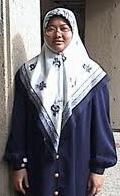 A Muslim woman now living in Malaysia struck a blow to the U.S. government’s “no-fly list” when a federal judge ruled Tuesday (Jan. 14) that the government violated her due process rights by putting her on the list without telling her why.
A Muslim woman now living in Malaysia struck a blow to the U.S. government’s “no-fly list” when a federal judge ruled Tuesday (Jan. 14) that the government violated her due process rights by putting her on the list without telling her why.
Muslims and civil rights advocates say the no-fly list disproportionately targets Muslims, and they hope the ruling will force the government to become more transparent about the highly secretive program.
“Justice has finally been done for an innocent woman who was wrongly ensnared in the government’s flawed watch listing system,” Elizabeth Pipkin, a lawyer representing Rahinah Ibrahim, said in a statement.
Ibrahim, 48, a mother of four with a doctorate from Stanford University, was waiting to board a flight from San Francisco to Hawaii en route to Malaysia in 2005 but was told she was on the no-fly list. She was eventually cleared to fly to Malaysia, but her visa was revoked soon afterward and she could not return to Stanford. She was never told why she was put on the list, and in 2006 she sued the government to find out.
Government lawyers argued that Ibrahim, as a Malaysian citizen, had no standing in U.S. courts and that no-fly list information must be kept secret for security reasons. The government also asked U.S. District Court Judge William Alsup of the Northern District of California to seal his ruling.
Instead, Alsup ruled that Ibrahim did have the right to sue and ordered the government to tell Ibrahim whether she is still on the list. The judge agreed to keep the full ruling sealed until April 15, pending a review of the government’s request for secrecy, but he did issue a summary of the ruling.
Ibrahim’s case is the oldest of three lawsuits brought by Muslims challenging the no-fly list. Some media reports estimate that 20,000 people are on the list, which has been blamed for delaying many innocent travelers. In 2012, an 18-month-old Muslim girl was ordered off a Jet Blue flight from Fort Lauderdale.
“Each year our offices hear from hundreds of individuals who are visited by the FBI and face related travel issues,” said Zahra Billoo, executive director of the California chapter of the Council on American-Islamic Relations. “Many have lost hope about clearing their names, but this case will renew our collective desire to continue forward with the courts on our side.”
Under the guidelines, people who have been stopped from boarding flights may file an inquiry with the Department of Homeland Security, but responses do not include information about whether the person is on the no-fly list, according to the ACLU. The only way to find out whether a person has been removed from the no-fly list is to buy a ticket and try to board a flight.
